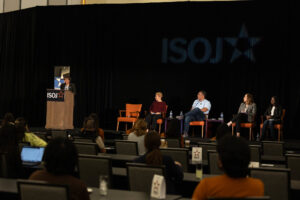During the second installment of the panel “Global roundup: lightning presentations about the state of journalism around the world,” participants of the 25th International Symposium on Online Journalism (ISOJ) learned about the experiences of violence and attacks on freedom of expression in different countries.
As she did earlier in the day, Dawn García, director of the John S. Knight Journalism Fellowships at Stanford University, moderated the conversation on the afternoon of April 13.
The first to speak was Pavla Holcová, investigative journalist and founder of the site investigace.cz, who is also a JSK fellow. Holcová began by explaining that she had been born in the then republic of Czechoslovakia, currently divided into the Czech Republic and Slovakia. Although she lives in the Czech Republic, she covers issues from Slovakia, a country that for her is no longer a country.
Her obsession with covering this “failed state,” as she explained, gained strength in 2018 when her journalist friend Ján Kuciak and his fiancee were murdered in retaliation for their investigations into alleged corruption networks that involved members of the State, businessmen and criminals.
The indignant response from not only fellow journalists but also citizens in general led to important arrests: 200 judges, five prosecutors and all police leaders who were allegedly involved in the crime.

Second part of a global roundup panel on the state of press freedom around the world. Dawn García at the podium. Seated from left to right: Pavla Holcová, Roberson Alphonse, Yana Lyushnevskaya and Hannah Ajakaiye. (Photo: Patricia Lim/Knight Center)
However, in the recent elections, the party involved in this corruption scheme won again. In his first conference, Holcová noted, the president made it clear that it would be a “government of revenge.”
“Now they are going to go after journalists,” Holcová said. “It was one of their first statements of the first press conference. They mentioned names of the journalists they are going to go after and it had really a chilling effect. Many of the journalists were already very tired of those five years struggling to investigate what happened to our colleague.
Holcová said that the year as a fellow at Stanford also helps her to gain more energy and continue with journalism.
“It's not over,” she said. “We just need to go, not to lose hope, and go into another round. I'm really happy. I'm taking this year off and can go back to Slovakia to do more work.”
In a moving testimony, Roberson Alphonse, head of national news for le Nouvelliste in Haiti, explained not only the violence he experienced firsthand, but the difficulties of continuing to work in exile.
“Sharing with you the experience of being in exile, the experience of dealing with traumas, and what I call the angel coming around to help me,” began Alphonse, who said that his wife has helped him get out of the most horrific days of his life, and to continue with his work so as “to not let the killers silence my voice.”
From a very young age, Alphonse explained, he saw inequality and corruption in his country, which gave him the impulse to work as a journalist and expose it.
“For decades, because of my investigations against corruption and against misuse of public money, I made myself a lot of enemies,” he said.
Those enemies became visible on Oct. 25, 2022 when Alphonse was ambushed while driving home. Two armed men got out of another vehicle and shot at him. “I don't know how I survived,” said the journalist, who immediately went into exile upon leaving the medical clinic.
“Exile is one of the most outrageous conditions a human being can experience. When they remove you from your country, from your community, when they remove your roots where you belong, it's a very violent situation,” he said. “Nevertheless, I consider I was lucky.”

Yana Lyushnevskaya, from Ukraine, speaks during a global roundup on press freedom around the world. (Photo: Patricia Lim / Knight Center)
Alphonse exposed grave numbers representing violence in his country: in the year he was attacked, six journalists were murdered. It’s a situation that has worsened since the assassination of President Jovenel Moïse, which has led to the country being in the hands of gangs.
His year as a Knight-Wallace Scholar at the University of Michigan has helped him heal some wounds. He called for support for both journalists in exile and those in Haiti, who have lost hope.
“That's why I have decided to be a voice, to engage in advocacy to protect journalists, in the advocacy –on a large scale– for human rights, because it's not acceptable to be a silent witness,” he said.
In turn, Yana Lyushnevskaya, senior journalist and deputy editor in chief of the BBC Monitoring bureau in Kyiv, Ukraine, explained that since the beginning of the Russian “invasion” of the country she has studied the response of Ukrainian media to the issue as well as the changes that have happened in these two years in the media landscape.
Although she accepted that even before the war there were difficulties for independent journalism in the country, especially due to the pressures of economic and political interest towards the media, she said that the war has meant “turbulence” for the media.
“Turbulence on every level imaginable from physical safety of journalists to economic challenges facing their media, to actual challenges with media freedom because wars inevitably come with elements of censorship and various restrictions on media operations,” the Nieman fellow said.
The safety of journalists, she said, is the main challenge. The war has become the main topic of coverage, which clearly creates a danger for journalists. Even those who might consider themselves to be in “peaceful” cities can be killed at any moment by a missile fired at their homes.
“And just imagine the toll it takes on journalists, on their mental health, on the work that they do,” said Lyushnevskaya who drew a distinction between journalists living in the country and those who can leave and return to a peaceful place. “We don't have that. This is our home. It is virtually impossible to disconnect. Even when you are not actually working, you're still living the reality of the war, which is why when you speak to journalists, one of the most pressing needs that they mentioned is mental health support.”
Another issue that causes concern in the country is the lack of personnel. Many journalists have fled the country out of clear fear of war and others, especially male journalists, have gone to war themselves (whether voluntarily or not).
“Many of them do not come back to journalism and they may not do that in the future either,” she said. “I have heard so many times that it is virtually impossible to find correspondence editors and technical staff for your TV channel, for example. There's just not enough people on the market.”
Of course, added to this are the economic problems that most media outlets face, but which in a context of war has been much greater.
This scenario has made it difficult to practice journalism beyond the war, such as, for example, conducting investigations into corruption in the government. However, Lyushnevskaya assured that there are several attempts. Recently, for example, the Minister of Defense was fired due to an investigation related to corruption.
“With all the extraordinary challenges, there are many signs of hope. But this kind of international journalism needs support and Ukrainian journalists need support, a lot of it,” she said.
The panel was closed by Hannah Ajakaiye, FactsMatterNG lead from Nigeria and also a JSK Fellow. The media landscape of this country, according to Ajakaiye, was quite vibrant, large with hundreds of television and radio stations but like all over the world, they have been declining. The positive thing about this, she said, is that a large number of digital native media outlets have been created, led especially by young journalists tired of the status quo in media and with other ideas of how to communicate.
However, “journalists have paid the price for democracy in Nigeria,” said Ajakaiye, who explained that the country has the most important democracy in Africa. She added that journalists continue to pay this price to be able to maintain it.

Hannah Ajakaiye, lead at FactsMatterNG in Nigeria and JSK fellow, speaks about the state of press freedom in her home country. (Photo: Patricia Lim/ Knight Center)
The country has seen its numbers of journalists murdered and forced into exile increase, she explained. Added to these threats are the arrests that journalists could face for their work. Ajakaiye recounted the case of her colleague who spent two weeks in prison for writing an investigation that reported on a corruption case involving a senior police official.
Cases of abductions of journalists, as well as disinformation campaigns in which journalists are the target, are also part of the violence that these professionals face in Nigeria. Recently, Ajakaiye said, cases of surveillance of journalists, as well as the leaking of their personal data, are cause for concern.
The scenario of threats, added to the low salaries, has prompted many journalists to go to work with the government or as public relations professionals.
“Some Nigerian journalists are pushing back. Of course, I always say that to be Nigerian is to be resilient because you always have to fight and survive through different challenges. I want to use this time to highlight young brave journalists who are pushing back and trying to do investigative reporting, that are changing the state of things in the country and trying to hold government accountable,” Ajakaiye said.
ISOJ is a global online journalism conference organized by the Knight Center for Journalism in the Americas at the University of Texas at Austin. In 2024, it is celebrating 25 years of bringing together journalists, media executives and scholars to discuss the impact of the digital revolution on journalism.